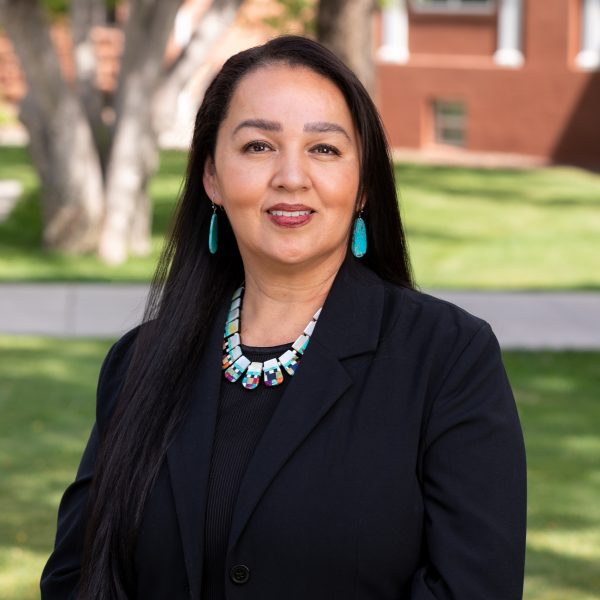People
Ann Marie Chischilly, Esq.
Vice President, Office of Native American and Indigenous Advancement
Office of the President
Ms. Chischilly serves in a dual capacity at Northern Arizona University (NAU) in Flagstaff, Arizona. In February 2022, she was named Vice-President of the Office of Native American and Indigenous Advancement (ONAIA). ONAIA is tasked with advancing NAU’s strategic goal, ‘to become the nation’s leading university serving Indigenous Peoples,’ with initiatives focusing on Native American student retention, tribal leadership, environmental stewardship in Native communities, culturally responsive K-12 pedagogy, and Native mentorship.
Ms. Chischilly continues to support the Institute for Tribal Environmental Professionals (ITEP). For the past 10 years, she has managed ITEP’s work with Northern Arizona University, state and federal agencies, Tribes, and Alaska Native villages. In 2022, ITEP celebrated 30 years of serving over 95% of all 574 Tribes and Alaska Native villages. ITEP remains the premier tribal environmental organization training Tribes and Indigenous Peoples.
Ms. Chischilly is an enrolled member of the Navajo Nation (Diné). She earned her Juris Doctorate (J.D.) degree from St. Mary’s University School of Law and a Master’s in Environmental Law (LL.M) from Vermont Law School. She is licensed in Arizona and is also a member of the International Bar Association.
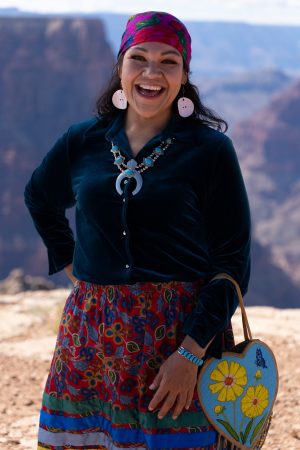
Ora Marek-Martinez, Ph.D.
Associate Vice-President, Office of Native American and Indigenous Advancement
Assistant Professor, Anthropology Department
Dr. Ora Marek-Martinez is a citizen of the Diné (Navajo) Nation and is Mountain Cove clan, she is also Nez Perce from Northern Idaho. As the Associate Vice-President in the Office of Native American and Indigenous Advancement, Ora’s work includes supporting and ensuring the success of Northern Arizona University Native and Indigenous students through Indigenized programming and services. She is also responsible for providing support and insights for the Tribal Consultation Program and assists the ONAIA Vice-President in this work. Dr. Marek-Martinez currently serves as the Seven Generations Indigenous Knowledge Center (7Gen Center) Director and serves as the Faculty Co-Chair of the Commission for Indigenous Peoples.
As an Assistant Professor in the Anthropology Department, her research interests include Indigenous archaeology and Indigenous Heritage management, including research and approaches that utilize ancestral or cultural knowledge in the creation of archaeological knowledge. Dr. Marek-Martinez’s other research interests include southwestern archaeology, Indigenous futurisms, and decolonizing and Indigenizing archaeological narratives of the cultural landscape on Indigenous homelands as a way to reaffirm Indigenous connections to land and place. Her current research focuses on an NSF awarded STC entitled “Center for Braiding Indigenous Knowledge in Science,” where NAU will be the Southwest Hub researching with Indigenous Communities, NAU Faculty and Students in the areas of climate change, protection of heritage places, and food sovereignty, a Flagstaff Indigenous Heritage Trail project, and an ethnographic research project on Indigenous archaeology that will contribute to the efforts in our discipline to move archaeology beyond its colonial origin. Dr. Marek-Martinez is also a founding member of the Indigenous Archaeology Coalition and was recently a consultant and featured in episode one of Streaming Curiosity’s documentary series “The Real Wild West”.
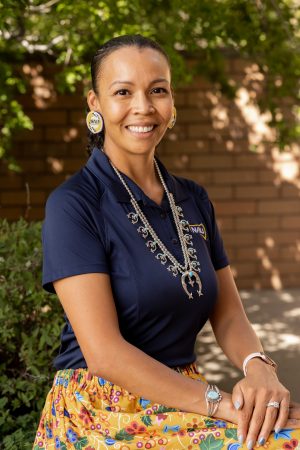
Kiara Weathersby Nikas MA IEd
Director, Building Manager of Center for Native American and Indigenous Futures (CNAIF)
Kiara Weathersby Nikas is an enrolled citizen of the Diné Nation. She is Ta’neeszahnii (Tangle People) of Inscription House, born for the Nahiłii (African Americans) Chickasaw & Choctaw of Prentiss, Mississippi. Her maternal grandfather is Diné (Navajo) of Indian Wells, and her paternal grandfather is Nahiłii. She was born and raised in Kinlaní (Flagstaff, AZ). She is the Director and Building Manager of the Center for Native American and Indigenous Futures for the Office of Native American and Indigenous Advancement (ONAIA) at Northern Arizona University (NAU). Her scope of work focuses on the retention and graduation of students at the university by supporting students in their academic journey through workshops, development of skills, and referrals when needed. Before transferring to NAU, she received her Associate of Arts (AA) degree from Coconino Community College (CCC). Kiara is a President’s Medallion recipient at CCC, Student Worker of the Year at CCC, and Student Employee of the Year for the State of Arizona. She earned two Bachelor’s degrees in Business Administration with an Emphasis in Management and Psychological Sciences from NAU. She is a recipient of the Gold Axe Award and the Theodore “Ted” Johnson Outstanding Senior Award at NAU. In 2020, Kiara earned her Master of Arts degree in Indigenous Education through Arizona State University’s School of Social Transformation via her Applied Capstone Project, “Indigenizing the Ways Student Affairs Educators Are Informed to Support Students in the Twenty-First Century and Beyond.” Kiara is the Chair of the Commission on Commissions. Kiara previously served as a co-chair for the Commission for Indigenous Peoples and as a Commissioner for the City of Flagstaff Indigenous Commission.
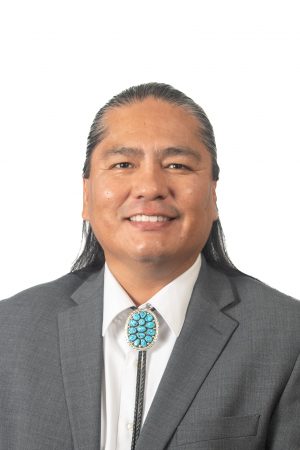
Colin Ben, Ph.D.
Asst Dir Seventh Generation Indigenous Knowledge Center, Office of Native American and Indigenous Advancement (ONAIA)
Colin Ben is a citizen of the Navajo Nation. He is of the Water’s Edge clan (Tábąąhí), born for Red-Running-into-the Water people (Tachii’nii). His maternal grandfather is of Bitter water clan (Tódich’iinii), and paternal grandfather is from the Salt People (Ashiihí). Colin was raised in the community of Shiprock and as first-generation college student, Colin learned how to navigate higher education by identifying staff, advisors, and faculty who supported his educational journey. With the support of these individuals, Colin earned his B.A. degree in Southwest Studies from Fort Lewis College, M.A. degree in American Indian Studies from the University of Arizona, and Ph.D. degree in Educational Leadership and Policy from the University of Utah. Dr. Ben’s dissertation, “Navajo students’ decision-making factors that influence access and persistence in doctoral education” is important because, as the number of Navajo students earning graduate degrees increases, the tribal skill set increases and simultaneously advances the efforts of tribal nation building.
Program Manager, Seventh Generation Indigenous Knowledge Center, Office of Native American and Indigenous Advancement (ONAIA)
Shanell Yenchik is an enrolled citizen of the Diné Nation. She is Deeshchii’nii (Start of the Red Streak Clan), born for Bilagáana (German). Her maternal grandfather is ’Áshiihí (Salt Clan), and her paternal grandfather is Czech. She was raised in a small town on the Navajo Nation called Tódínéeshzhee’ (Kayenta, AZ).
Shanell is a first-generation college student who started at Utah State University-Blanding, a community college, where she earned her Associate of Science degree. She then transferred to Northern Arizona University (NAU) where she received two bachelor’s degrees, a B.A. in Anthropology and a B.S. in Sociology. Shanell decided to continue her passion for education and earned her M.A. in Anthropology with a sociocultural emphasis from NAU in 2023. Her thesis research focused on the validity and importance of Indigenous cultural knowledge and decolonizing and Indigenizing ways of viewing health and wellbeing.
She is the Program Manager of the Seventh Generation Indigenous Knowledge Center for the Office of Native American and Indigenous Advancement (ONAIA) at NAU. Shanell’s main responsibility is reviewing all Tribal Consultation requests for NAU’s Tribal Liaison. She also develops and implements education and training for NAU administration, faculty, staff, and students on Tribal Consultation, Indigenous Research, Ethics and Methodology (IREM), and Indigenous Traditional Ecological Knowledges (ITEK).
The NAU Tribal Consultation policy implements and supplements Arizona Board of Regents (“ABOR”) Policy 1-118, which requires good faith consultation with federally recognized Native American tribes regarding proposed research, initiatives, agreements, programs, policies, or other activities that may have foreseeable implications for tribes or their individual members
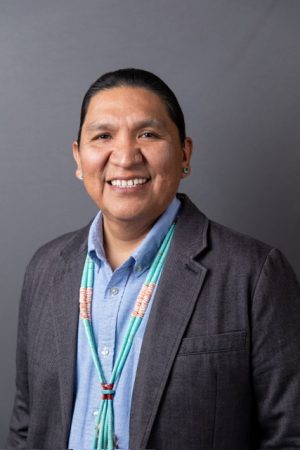
Darold H. Joseph, Ph.D.
Director, Institute for Native-Serving Educators
Assistant Professor
Educational Specialties
Darold H. Joseph, Ph.D., is Paa-Is-wung-wa (Water Coyote Clan) from the Hopi Village of Lower Moenkopi. He is a son, brother, uncle, husband, father and grandfather to his family. His father’s family represent the Nuva-wung-wa or Snow Clan from the Village of Shungopavi. Dr. Joseph was raised on Hopi and graduated from the Tuba City High School. He received his dual bachelor’s degree in elementary and special education and his master’s in Educational Leadership with an emphasis in Disability Studies, both from Northern Arizona University. His career began with becoming an Assistant Director for a Developmental Disabilities Day Program serving adolescents and adults with disabilities in an urban setting. Soon after he returned home to Hopi and worked in K-12 Special Education settings as a teacher and administrator. Informed by his experiences, Darold was emboldened to address the systemic barriers and inequities existing in education particularly related to the Native American population and so he left the K-12 environment to pursue a PhD in Special Education with a minor in Language, Reading, and Culture at the University of Arizona.
Dr. Joseph is now an Assistant Professor within the department of Educational Specialties in the NAU College of Education preparing pre-service and in-service educators in the professions of Special Education and Elementary Education. He has previously taught as an adjunct faculty for the Applied Indigenous Studies department and also served as Tribal Vocational Rehabilitation Specialist for the National American Indian Vocational Rehabilitation Training and Technical Assistance Center. His current work is focused on examining the sociocultural constructs of educational systems that inform the inequities experienced by Indigenous youth to persist in educational settings. Additionally, he is part of multiple research projects that are thematically focused on the cultural well-being of Indigenous youth by developing practices and strategies that are culturally sustaining and responsive to the educational and behavioral health needs of students. Which one of those projects include being a research specialist with the Diné Institute. His history of experience has culminated and contributed to sustaining relationships with students, communities, and professionals within and outside the broader community of NAU supporting and leveraging the self-determination and sovereignty of federally recognized tribes, related to the education, health, and wellness of Indigenous youth. One such effort Dr. Joseph is honored to be a part of is, and on the behalf of the Hopi Tribe, is serving as the Chair of the Hopi School System Transition Team made up of school administrators, educators, school staff, and parents to lead the efforts with developing a new unified Hopi School system.
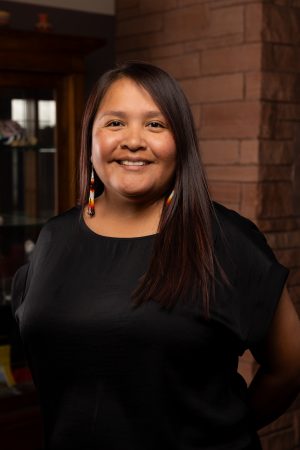
Denyse Herder, M.Ed.
Community Program Coordinator, Sr., Institute for Native-serving Educators
Denyse Herder, M.Ed., is Diné and Paiute from the Leupp community. She is a mother, wife, and relative to her family. She represents the clans Báyóodzin (Paiute), Tséníjíkiní (Honey Combed Rock People), Hashk’ąą Hadzohí (Yucca Fruit Strung Out in a Line People), and Tł’ízí Łání (Many Goats People). She was raised in Leupp and graduated from Sinagua High School in Flagstaff. As the INE Community Program Coordinator Sr., Denyse’s work involves supporting INE programs which aim to strengthen PK-12 schooling in Tribal communities through culturally responsive professional development. She earned both her bachelor’s degree in Applied Indigenous Studies and a master’s degree in Counseling-Student Affairs from Northern Arizona University.
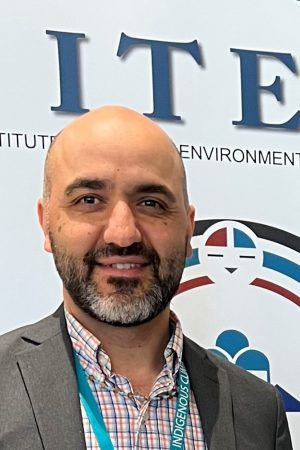
Mehrdad is the Co-Director of the Institute for Tribal Environmental Professionals (ITEP) at Northern Arizona University in Flagstaff, Arizona. Mehrdad joined ITEP in July of 2003.
Before joining ITEP & NAU, Mehrdad worked for the Pueblo of Jemez as Director of the Jemez Department of Resource Protection. He has worked in the Native American environmental and natural resource management field since 1996. Work experience includes U.S. Environmental Protection Agency Region 6 Tribal Operations Committee delegate; Department of Energy (DOE) State Tribal Government Working Group (STGWG) delegate; New Mexico Inter-tribal Resource Advisory Council (IRAC); Ex-Officio member Tribal Air Monitoring Support Center; Ex-Officio member of the National Tribal Air Association; development of multi-media environmental monitoring programs; and strategic resource management and planning.
As ITEP’s Co-Director, Mehrdad works closely with the ITEP Co-Director Nikki Cooley to provide leadership in strategic planning, oversight of ITEP’s multi-media environmental program activities and initiatives, support for new program development, university relations, serve as PI for ITEP grants & contracts; and management of ITEP’s human and financial resources.
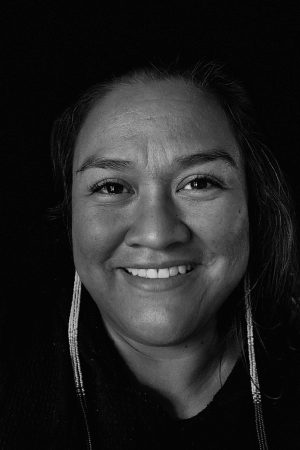
Nikki Cooley, MF
Nikki Cooley is of the Diné (Navajo) Nation and is of the Towering House People, born for the Reed People, paternal and maternal grandfathers are of the Manygoats People and Water that Flows Together People, respectively. She is from the Diné communities of Shonto and Blue Gap, AZ, and currently resides in Flagstaff.
Ms. Cooley serves as a Co-Director for the Institute for Tribal Environmental Professionals (ITEP) and helps oversee the Tribes & Climate Change Program. ITEP’s goal is to strengthen tribal capacity and sovereignty in environmental and natural resource management through culturally relevant education, research, partnerships, and policy-based services. She works across the continental US and Alaska on outreach and workshops related to climate change adaptation, mitigation, and resilience planning with Tribal/Indigenous partners to assist Tribal Nations in addressing and preparing for climate change impacts. ITEP works in partnership with various federal, nonprofit, academic, and community entities. Ms. Cooley is a co-author on the Human Health Chapter for the fifth National Climate Assessment (NCA) and is a co-author on the 2021 Status of Tribes and Climate Change (STACC) Report and the upcoming second volume focused on Indigenous Knowledges. ITEP convenes this report with authors from across the country including many Indigenous scholars and community members. Ms. Cooley has a Master’s degree in Forestry from Northern Arizona University.
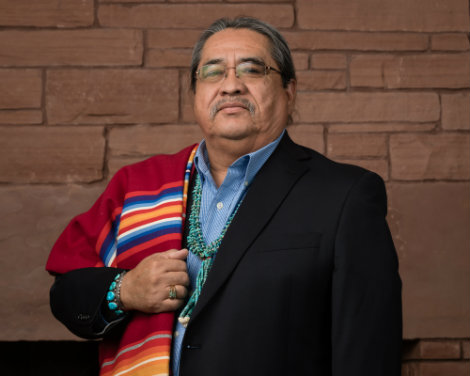
Manley Begay, Ed.D.
Director, Tribal Leadership Initiative
Professor
Applied Indigenous Studies and Politics and International Affairs
In addition to faculty appointments in the Departments of Applied Indigenous Studies and Politics and International Affairs, Dr. Begay (Navajo) is affiliate faculty in the W. A. Franke College of Business at Northern Arizona University. Since 1997, he has also been co-director (with Professors Joseph Kalt and Stephen Cornell) of the award-winning Harvard Project on American Indian Economic Development at the John F. Kennedy School of Government at Harvard University, working for and with Indigenous governments, enterprises, organizations, and communities world-wide, providing research, advisory services, and executive education on issues of nation-building and economic development. Professor Begay is recognized nationally and internationally as one of the primary planners and designers of the now-accepted theory of how Indigenous nations and communities build nations that work.
